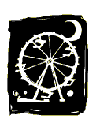Review by John Rocco, from the American Book Review
UNLOCKING ELVIS
Beaver Dam Rocking Chair Marathon: Fragments of a Lost Text
Ron Whitehead
Tilt-A-Whirl Press; 90 pages, $10.00
In 1953 Elvis Presley walked into Sun studio to record a song for his mother. He also walked into Sam Philips who had been searching for a white voice to combine with the music of Howling Wolf, the music where Philips believed "the soul of man never dies." Philips had initial reservations about Elvis because he appeared to be too timid for the task; but the man who opened Sun had a way of opening musicians: "A lot of times you've got to unlock that person. I think freeing up a man's thoughts can be the catalyst for his creativity in any field, and especially music." Elvis' first record had "That's All Right, Mama" on one side and "Blue Moon of Kentucky" on the other. years later he made a famous appearance on The Ed Sullivan Show. And years after that he makes an appearance in Ron Whitehead's Beaver Dam Rocking Chair Marathon: Fragments of a Lost Text.
Elvis is a presence in the poetry and the prose poems that make up Beaver Dam Rocking Chair Marathon. But not just the King: rock culture itself is a force in the book as it is a force in all of Whitehead's work. In "Music Saved My Life and Jesus Saved My Soul: The Impossible Dream," a poem early on in this "novel" made up of "fragments," Whitehead's autobiographical character Bone leaves church after his voice has been criticized:
I went home swearin I'd never sing again
and I didn't until I got in the car
turned on the radio and heard Elvis croonin
bout some old Kentucky backroads
and I caught myself breakin my promise
singin
"Singin" is the right word: Whitehead sings about his life and his memories of a place called Kentucky and the people who grew up and lived and died around him. The book is a "novel" in the sense that its parts - songs, poems, stories, pictures, drawings - form a Bildungsroman, an "unlocking" of Whitehead's growth and life and voice. And the important event within all these "fragments" - fragments he shored against his ruins - is a contest to see who can sit and rock in a rocking chair the longest.
Joyce's Stephen Dedalus has Dublin and Whitehead's Bone has Ohio County, Kentucky, the place he calls, following Buck Mulligan in Ulysses, "the omphalos, the naval of the world." Ohio County is not the omphalos for us all, but it is for Bone. Bone's gods include God, Elvis, and the other two parts of the Holy Rock Trinity: "but I'm jumpin ahead cause for our generation Bob Dylan and The Beatles did it too." Bone's world is a place of hard work in coal mines and poor people and Holy Rollers. And the Beaver Dam Rocking Chair Marathon. It is a contest the town participates in to see who can rock the longest; 144 people take the test and so does Bone:
He wants to know what will happen if he keeps on and on
until no one rocks but him. He wants to feel what will happen
inside him when he pushes his consciousness over the edge to
places it has never been.
It is a long contest; it goes on for days. We learn about some of the participants: a battered woman, a sailor, a coal miner, Bone. Whitehead remembers this incident from the past and covers it with other memories including watching his grandfather preach to a congregation of Holy Rollers ("Visions of The Second Coming dance in Bone's head") and his mother killing chickens ("She popped their heads off"). Whitehead "unlocks" each memory so that they become charged with his history and the embrace of his subject. It is a Beat art and it takes inspiration from the embrace of the Beat "moment," or what Ginsberg describes in his introduction to Kerouac's Visions of Cody as the Meeting of "the great rememberer" (Kerouac) with "the great experiencer" (Cassady). Coming after the Holy Trinity of the Beats and living in an age when only St. Dylan still hits the stage, Whitehead is his own "rememberer" and his own "experiencer." In Beaver Dam Rocking Chair Marathon this comes together as an evolving, scintillating portrait following Ginsberg's definition in "The Great Rememberer": "Art lies in the consciousness of doing the thing, in the attention to the happening, in the sacramentalization of everyday reality, the God-worship in the present conversation, no matter what."
There are two key words in Whitehead's title: "Rocking" and "Marathon." "Rocking" is the "happening" and it is also the culture of rock that Beat writing and Beat living made possible (the rock bands who point to On the Road as their beginning range from the Grateful Dead and the Doors to REM). "Marathon" is the Beat test of endurance first observed in Herbert Huncke's life and later performed in Kerouac's bursts of writing (The Subterraneans in three days!). Whitehead's work is preoccupied with touching the edge of limits and this has recently been displayed in the Insomniacathons - marathon poetry readings and musical performances - that he has organized around the country, including the 48-hour one that began NYU's 50-year Beat Generation Celebration. (The energy of Whitehead's own reading can be heard on the CD Tapping My Own Phone, a mercurial collection featuring some of the "fragments" that appear in Beaver Dam Rocking Chair Marathon.) Capturing the memory of what Ginsberg calls "Mortal" America - Ohio County, Kentucky, Bone's omphalos - is what this "novel" accomplishes as it points to the "unlocking" of Whitehead's writing:
and then came Elvis and my parents said
turn it off but they were glued too and
didn't couldn' move eyes starin in disbelief
but excited like what in the world is this.
|

